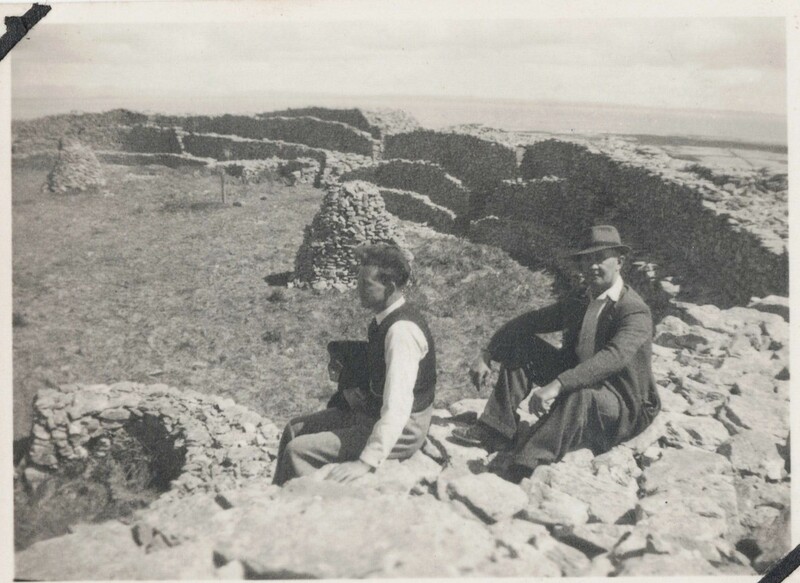Inishmaan stone fort, 1948
Item
Format
JPEG
Title
Inishmaan stone fort, 1948
Identifier
VHG0048
Depiction
Two men sitting in the surrounds of stone and rock walls and structures
Description
The photograph shows Patt Larkin, Prof. of Education, UCG (on the left of picture) with Mr. McGinley, a kelp inspector, on Dún Conor (Dún Chonchúir) on Inishmaan, Aran Islands. Dún Conor (Wikipedia_Conor, 2023) is a stone ringfort with partly rebuilt (by the OPW (Office of Public Works) ‘clocháns’ or stone houses. The three-stage, dry-built rampart is probably pre-Christian in foundation.
The kelp industry was important to the subsistence economy in the Aran Islands. Images of large piles of seaweed drying, prior to its burning for the iodine industry, are shown in the Chambers Archive, held by Galway County Council (Galway County Council Archives, 1929-1938); (J. Higgins,1931, pp 59 – 72). The seaweed was collected from rocks after the storms of autumn and winter, dried on fine days, and then made up into a rick, where it was left until the beginning of June. It is then burnt in low kilns on the shore, a process that takes from twelve to twenty-four hours of continuous hard work. The kiln holds about two tons of molten kelp, and when full it is loosely covered with stones and left to cool. In a few days the substance is as hard as the limestone and has to be broken with crowbars before it can be placed in curraghs for transport to Kilronan, where it is tested to determine the amount of iodine it contains and paid for accordingly. In former years good kelp would bring seven pounds a ton, now four pounds are not always reached (J. Higgins,1931, pp 59 – 72). The income gleaned from its collection, burning, sale and transport was significant for the Islanders (D. Fitzpatrick, 2012). In former years, good kelp would bring seven pounds a ton, now four pounds are not always reached (J. M. Synge,1907, pp 194-5).
The kelp industry was important to the subsistence economy in the Aran Islands. Images of large piles of seaweed drying, prior to its burning for the iodine industry, are shown in the Chambers Archive, held by Galway County Council (Galway County Council Archives, 1929-1938); (J. Higgins,1931, pp 59 – 72). The seaweed was collected from rocks after the storms of autumn and winter, dried on fine days, and then made up into a rick, where it was left until the beginning of June. It is then burnt in low kilns on the shore, a process that takes from twelve to twenty-four hours of continuous hard work. The kiln holds about two tons of molten kelp, and when full it is loosely covered with stones and left to cool. In a few days the substance is as hard as the limestone and has to be broken with crowbars before it can be placed in curraghs for transport to Kilronan, where it is tested to determine the amount of iodine it contains and paid for accordingly. In former years good kelp would bring seven pounds a ton, now four pounds are not always reached (J. Higgins,1931, pp 59 – 72). The income gleaned from its collection, burning, sale and transport was significant for the Islanders (D. Fitzpatrick, 2012). In former years, good kelp would bring seven pounds a ton, now four pounds are not always reached (J. M. Synge,1907, pp 194-5).
People
Patt Larkin
References
Wikipedia contributors, ‘Inishmaan stone fort, 1948, Wikipedia, The Free Encyclopedia,
https://en.wikipedia.org/wiki/D%C3%BAn_Conor, accessed 16 December 2023.
Within ‘Island Images: From the Chambers Archives, 1929 – 1938 in Galway County Council Archives.
The Aran Islands and Galway City Images, 1931 by Dr. Jim Higgins, pp 59 – 72.
Synge and Edwardian Ireland, Oxford University Press; Fitzpatrick, David, 2012.
Synge, John Millington, 1907, The Aran Islands, World Classics Edition 1962, pp 194-5
https://en.wikipedia.org/wiki/D%C3%BAn_Conor, accessed 16 December 2023.
Within ‘Island Images: From the Chambers Archives, 1929 – 1938 in Galway County Council Archives.
The Aran Islands and Galway City Images, 1931 by Dr. Jim Higgins, pp 59 – 72.
Synge and Edwardian Ireland, Oxford University Press; Fitzpatrick, David, 2012.
Synge, John Millington, 1907, The Aran Islands, World Classics Edition 1962, pp 194-5
Contributor
Bibliographic Citation
P. Larkin, S.G. Jennings, ‘Inishmaan stone fort, 1948’, Visual History Retired Staff Collection, University of Galway Digital Collections, Asset Id 14439, Archival Record Id VHRS
Spatial Coverage
Temporal Coverage
Period
1940's
Category
b&w
group
off-campus
outdoors
Keywords
Field trip
Language
English
Irish
Publisher
University of Galway Library
Rights
This image may be used for non-commercial purposes under CC BY-NC-SA
see https://creativecommons.org/licenses/by-nc-sa/4.0/
see https://creativecommons.org/licenses/by-nc-sa/4.0/

